This was a big year, bigger than I had remembered when I sat down to write this
thing. Somehow, I'd forgotten about half of this stuff, and rolled the other
half into 2015 in my head. But 2016 wasn't all terrible. Here are the
highlights:
Personal
2016 was a big deal on the where-to-live front. I finally got my wish and we
moved away from the Netherlands and into a real city: London: The Centre of
the World.
It turns out however that London is a rat infested toilet drowning in social
inequality in a country rife with xenophobia, nationalism, and a dangerous mix
of pride and ignorance.
Yes, you can quote me on that.
Our flat was a dark, damp, rat infested hellhole with a ground-floor view of
a wall (the British love walls and fences almost as much as they love
classism). The Tube is a remarkable feat of marketing that has managed to
brand a hobbit tunnel of loud, stinky, smoggy,
dampness as "modern" and "cultured". And absolutely everywhere you go, there
are homeless people, stepped over and ignored: immediately by the public, and
systemically by the government. They even have a quaint British term for them
so it doesn't sound so tragic: rough sleepers.
London is amazing if you're a tourist, but once you live in its decaying
buildings, commute on its antiquated transport, or are forced to breathe its
toxic air for more than a few days, you recognise it for what it is: a terrible
place to live.
...which is why we moved to Cambridge
The air is cleaner here, the roads more bike-friendly (though it has a long way
to go before achieving Amsterdam-level cycling support) and nearly everything
is walkable. It's a town more-or-less built for people, as opposed to London,
which is built for plebs.
Our flat here is in a lovely modern building with proper ventilation and
underfloor-heating. It's cool & quiet in the summer, warm & dry in the winter,
and my commute is 30 minutes by bike along the river. Christina rides her bike
through town in about 12 minutes.
Come visit us in Cambridge. You'll wonder what the hell everyone is doing in
London.
Travel
As with every year I've lived in Europe, I did a reasonable amount of
travelling this year, and once again, it feels as though I didn't travel
enough.
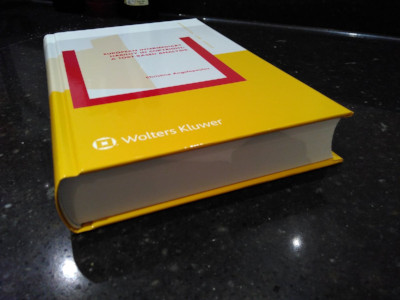
Amsterdam
We may have left town, but Christina still had to return to defend her PhD in a
process that's part ceremonial (you should see the Wizagamot-esque robes) and
part academic (she literally had to defend her PhD against questions from
academic rivals and friends). Unsurprisingly, she dominated the event, and
walked out with a shiny new piece of paper attesting how brilliant she is.
Αθήνα & Μετέωρα
Right after Amsterdam, we hopped on a plane to Greece for Orthodox Easter where
I once again ate far too much food and enjoyed the sunshine. This holiday
included a road trip out to Μετέωρα
where we did a little hiking and sightseeing around the monasteries in the
area.

Copenhagen
The bi-annual RIPE Meeting was held in Copenhagen and as they had a hackathon
for monitoring software, I signed up to play -- and my team won!
Our project was called HALO,
a heads-up display for your network, and the source code is here
if you're curious.
Sesimbra
Christina's friend Ana got married in Sesimbra, Portugal this year and I'm so
glad that I was able to attend. The wedding was lovely, and the country,
beautiful. The food was good, the people friendly, and the view from our hotel
room was awesome. Twitter has a few pictures.

Vancouver & Kelowna
The biggest news of the year is of course that my niece, Lucy was born! I was
careful to time our trip home to coincide for her birth, but she had the
indecency to be born a couple weeks premature, so when we finally showed up, we
got to visit her in the hospital.
The trip home was also an opportunity to introduce Christina to Vancouver in
the summer time. We also had an engagement party there so my family that can't
make the trip to Greece would have an opportunity to spend some time with
Christina. There's a great big blog post about it
if you're curious.
Brussels
I was in Brussels twice in 2016. Once for my annual trip to FOSDEM,
and later for Freedom not Fear, a series of
meetings & workshops around freedom, surveillance, and politics in the EU. The
former was great (it always is), and the latter, combined with my experience at
Mozfest this year has given me some serious
insight into the nature of EU politics. I want to do a separate post about
that later though.
Madrid
There was another RIPE Meeting in 2016, and I showed up for that hackathon too.
We didn't win though -- I think -- I had to leave before the announcements, but
I don't think we did. The project was called "Pinder" or, Tinder for
peering and the presentation is here,
the code here, and an explanation over
at peer.sexy.
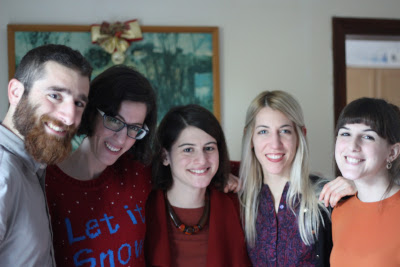
Αθήνα, Again
One last trip back to Greece this year to make up for all the time Christina
lost while working on her PhD. This was primarily a Christmas trip, so it was
all just meeting with family, eating far too much, and exchanging presents. I
also used some of the down time to work on my own family project that I
mentioned in a previous post: my grandpa's video archive.
There are some photos here
if you're curious.
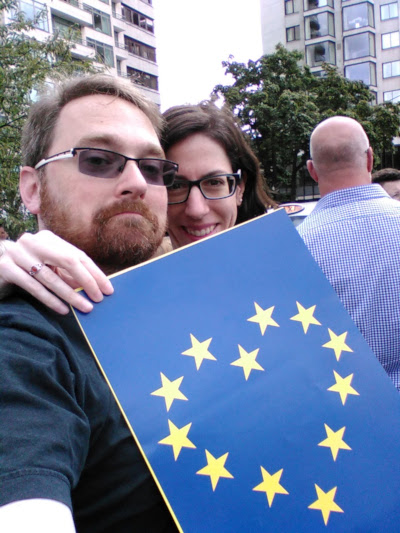
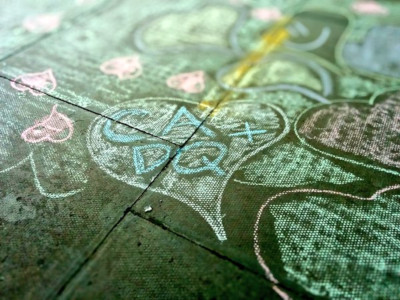
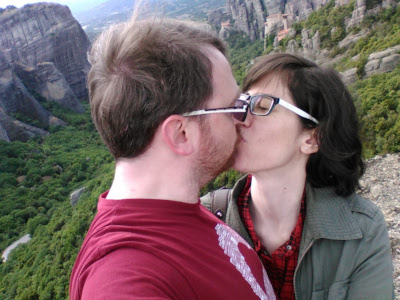
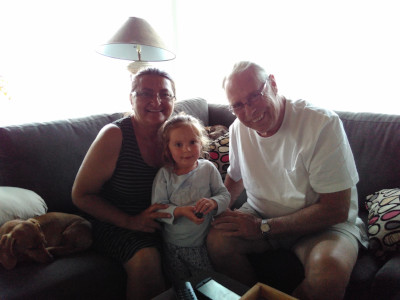
Professional
This was a big year for me professionally. I started contracting, started
working for government, and took on a lead role at another company. I also
almost got a job I desperately wanted, so I'm including that here too.
UKTI
The move to the UK started with my first (and likely last) government job ever.
This was big money and a big title combined with everything you've heard about
government work and more. I have never been more angry and frustrated on the
job than I was there, but I probably would have stuck it out were it not for
the fact that they were selling weapons to people what shouldn't have them.
Gynii-Me
In parallel to my work at UKTI, I started helping out a brand-new start up with
occasional technical advice in what their options were for building a women's
fertility web platform. I don't get paid, but I do help out where I can,
vetting agency proposals and explaining complex technical topics to the company
CEO. It's a fun side gig, and they're good people so I'm happy to help where I
can.
Cyan
I moved from UKTI to a company called Cyan/Connode who were super-convenient,
as they had a London and Cambridge office and we were moving up there in a few
months. I helped them out on the technical front, and helped management
understand a little about why they were having retention problems, but was
terribly unhappy, so I got out of there after a few months.
Mozilla
In my quest to get out of Cyan, I applied to Mozilla for what would have been a
pretty amazing position: engineer on the incredibly popular Mozilla Developer Network.
Unfortunately, while I made it to the very last round, I didn't get the job,
which sucked, but it was an honour to make it that far anyway.
Money Mover
I ended up moving on to a fintech company that has an office just outside of
Cambridge and wonderful staff of truly friendly and engaged people. Seriously,
best work environment ever. It's a small team right now, but we'll be
growing in 2017. My role is Lead Developer which is pretty fabulous, and my
current Big Job is picking up the code left from an agency that did the bulk of
the work for the company over the last few years and making it ours. Having
worked at a few agencies in the past, I suppose I deserve this :-/
Projects
Like every year, I overextended myself on New Projects as well as building on
the old.
Paperless
Early in the year, I suddenly lost interest in my super-popular project, Paperless
when I discovered that there was an eerily-similar project
out there doing things better than I had. I didn't really do much more than
field pull requests for much of the year, but toward the end, there seems to be
a lot more interest all of a sudden, and I've started doing a little more work
on it.
There seems to be a "market" for a project like Paperless which is much less
complicated and capable of running on lighter hardware.
Korra
Working for government introduced me to the clusterfuck that is "security" in
large office environments. I wrote something fun & easy to self-host and it
got a reasonable amount of attention on Reddit and at the London Django meetup.
Basically, Korra lets you share files
easily, without special software, and securely so that you don't have to do
insane things like email people's passports or private government documents
around.
Spirithunter
When I started commuting longer distances (to Cambridge from London for while)
I started back in on Spirithunter,
trying out Django's new Channels support (OMG it's awesome). However, when my
commute shrunk to a 30min bike ride, all of that development stopped. I might
pick it up again when I'm bored one day, or if Mihnea decides he wants to hack
on it with me.
Global
I know that this is a personal blog, so it seems kind of silly to reflect on
global events here, but these things affect me, so I thought it relevant.

#Brexit
What a disaster. After living here only a year, I'm not surprised at all that
this country voted to Leave the EU, but I'm still saddened by it. It will take
generations for this country to recover from this mistake, and knowing what I
now know about British culture, I'm sure they'll find a way to look back on all
of this as some sort of Trial they all had to go through, that they survived
because Britain Prevails or some doublespeaking-fluff like that.
I'm more concerned about the rise in hate-crime here though, and the remarkable
tendency people here have to blame immigrants for everything wrong with the
country -- especially when it's plainly obvious that the current government's
malevolent domestic policy is really what's at fault.
Trump
I called it and now it's going to
happen. As an outsider, I kind of want to sit down and watch everything burn with
a bowl of popcorn; this is after all what the public voted for. He, along with
the Republican House and Senate are going to hollow out the US and give people
everything they asked for. I can only hope that they serve as a cautionary
tale for the rest of us.
Deaths
A lot of important people died this year: Bowie, Prince, and Castro to name a
few. For me though, this will always be the year Leonard Cohen
died. The world is diminished without him in it.
Of course Rob Ford and Antonin Scalia died this year too. I'm really not all
that bothered by that. I suppose that's one of the greatest things about the
Reaper: he doesn't care who you are. When it's your time, that's it.
Conclusion
So that was 2016. Hopefully at this time next year I'll be posting about how
in 2017 I finally got Romanian citizenship, and how Christina and I finally
have a date & location for our wedding.
I'd like to do some more travelling to undiscovered (by me) places this year.
At the very least, I'd like to see more of Scotland and maybe even Romania and
the Czech Republic. None of that is booked yet though.
Here's hoping fewer of our heroes than villains die in 2017.









